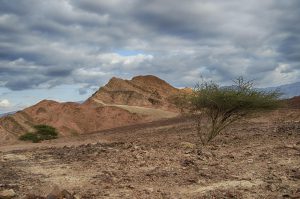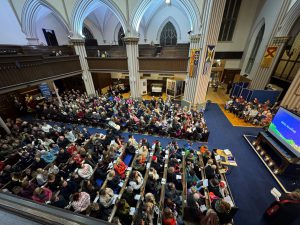My parents are downsizing. They’re going through their stuff, deciding what it is they value and what they have room for in the new place. They would love to pass along the things they treasure to their children and grandchildren. “Do you need these candlesticks?” they ask one day. “How about these dishes?” they ask the next.
How many of us has been in that situation? Parents or grandparents start to think about their end of life and want to pass along old treasures. But more often than not, the next generations are saying, “No, thank you.” My young adult children don’t want a fancy place setting for 12, no matter how nice it is. I get it. Those dishes can’t be put in the microwave. They aren’t necessarily dishwasher safe. Some of the really old ones may contain lead. Or they are simply not the right vibe.
But even though they don’t want the old dishes, they still have to eat.
Old Treasures
Our current church experience is often like this. We have some beautiful and expensive stuff that we’ve used to serve God and feed spiritual hunger—big sanctuaries that cost a fortune to heat, organs whose repairs cost more than the part-time pastor’s salary, solid and trustworthy pews that will outlive us all. But just like the dishes of another generation, lots of people don’t appreciate or want them. Does this mean people don’t have spiritual hunger? No. That they don’t need or want to worship Jesus? No. Just as other generations are choosing to eat from different dishes, there are large numbers of people telling us they want to feed their spiritual hunger in a different way. And while some people in churches think there is something wrong this, the story of Joshua leading the people of Israel into the promised land after Moses’ death shows us that these generational differences happen regularly.
 If you know the Exodus story, you might remember that Moses led a group of people out of slavery in Egypt to a new, promised land. But it was not a short trip. Because they sinned and did not trust God, the Israelites spent 40 years on that trip that could have taken a few weeks. And Moses would not be the one to lead the people into the promised land. That 40-year trip meant that a lot of their older folks died, and by the time they neared the promised land, the majority group was a new generation who didn’t know anything about Egypt, except from the stories the old folks told them. They didn’t know what their ancestors ate in Egypt; they didn’t know what it was like to be a slave; they didn’t have the experience of God stopping the waters while they walked through the Red Sea—wandering in the wilderness eating manna was all the new generation knew. Just as this generation of Israelites did not miss the cucumbers and leeks their ancestors had left behind, in our post-Christian world, younger people don’t miss full sanctuaries like our older members do, because they’ve never been in one.
If you know the Exodus story, you might remember that Moses led a group of people out of slavery in Egypt to a new, promised land. But it was not a short trip. Because they sinned and did not trust God, the Israelites spent 40 years on that trip that could have taken a few weeks. And Moses would not be the one to lead the people into the promised land. That 40-year trip meant that a lot of their older folks died, and by the time they neared the promised land, the majority group was a new generation who didn’t know anything about Egypt, except from the stories the old folks told them. They didn’t know what their ancestors ate in Egypt; they didn’t know what it was like to be a slave; they didn’t have the experience of God stopping the waters while they walked through the Red Sea—wandering in the wilderness eating manna was all the new generation knew. Just as this generation of Israelites did not miss the cucumbers and leeks their ancestors had left behind, in our post-Christian world, younger people don’t miss full sanctuaries like our older members do, because they’ve never been in one.
God Does A New Thing

Photo credit: Bill Rice, Flat Rock, Mich.
In the Bible story, the Israelites’ wandering comes to an end near the Jordan River, and it comes with a leadership change as Joshua takes over from Moses for a new time and place. Moses and Joshua are very different leaders, because the people and place of their ministries is totally different. Both are men of faith seeking to do God’s will. Moses is a pray-er with a staff; Joshua is a warrior with a sword. Moses had the wisdom and seasoning to get them around in the desert; Joshua has the vision and energy to boldly lead into a new reality. Both work together as they approach the promised land, but when they get to the edge of that new land, Moses lays his hands of Joshua and passes on the spirit of wisdom that he has learned in leading the people out of Egypt—but not because he is old and weak (the Bible says he was still strong). It’s possible that Moses did not lead the people into the promised land himself because it was time for God to do something new. It was time for Joshua to lead.
Once Joshua does take on leadership, God parts the Jordon River so that the people can walk through on dry ground into the promised land, echoing the sea parting before Moses as he led the Israelites out of Egypt. We see an act of historical continuity as Joshua receives Moses’ wisdom and leads the people into something new.
Our world today is in a similar time of transition. Like the Israelites, we are entering a world that we cannot fully see, understand, or predict—a world that is completely different from the one we are in now. As we ourselves approach this new world, we can take lessons from the way our spiritual ancestors navigated change: they stepped out in faith, they experienced God at work even as their “food” changed, and they trusted God to stay with the people even through a leadership change.
Stepping Out in Faith
 The Jordan River marked a boundary, as rivers often do. As Joshua led the people through the chaos of boundary-crossing, the first thing they did was worship, pray, and consecrate themselves. Then, the priests stepped out in faith.
The Jordan River marked a boundary, as rivers often do. As Joshua led the people through the chaos of boundary-crossing, the first thing they did was worship, pray, and consecrate themselves. Then, the priests stepped out in faith.
When the people broke camp to cross the Jordan, the priests carrying the ark of the covenant went ahead of them. Now the Jordan is at flood stage all during harvest. Yet as soon as the priests who carried the ark reached the Jordan and their feet touched the water’s edge, the water from upstream stopped flowing. (Joshua 3:14-16)
They didn’t wait for the water level to go down; they went down to the river with the ark of the covenant and walked into the flood. The priests stepped into the water before it stopped flowing; the water stopped after the priests put their feet into the chaotic churning.
We, too, are at a metaphorical river—a “boundary”—doing ministry in a time of radical transition. It would be easy to camp out on the edge of the river, holding onto what feels safe and convenient, waiting to see what happens. But God rarely calls us to something easy. We need to trust that God goes before us and be brave in our lives and ministries; we need to step into the churning water trusting God to get us across.
Eating the Manna
 People both inside and outside of the church have a deep, spiritual hunger—a need to connect with God and each other. But those of us in the church may be using the wrong dishes to feed them, trying to meet that spiritual need in ways that aren’t making sense to a new and different generation of people. Just like my parents with their dishes, the congregations in a lot of our churches are bewildered that people don’t want what they wish to pass down in love.
People both inside and outside of the church have a deep, spiritual hunger—a need to connect with God and each other. But those of us in the church may be using the wrong dishes to feed them, trying to meet that spiritual need in ways that aren’t making sense to a new and different generation of people. Just like my parents with their dishes, the congregations in a lot of our churches are bewildered that people don’t want what they wish to pass down in love.
There are congregations who will need a new generation’s understanding of our time, vision, energy as they look out at a new world—Spirit-led leaders with authority to figure out how to serve the spiritual food people are so hungry for. Many people will long for the way things used to be, as the Israelites in the desert missed the old ways, the kinds of food they ate in Egypt. We don’t like the manna God provides, or the new dishes, or new music, or having classes online—this lament is as old as the Bible. But the good news is that even in our confusion, fear, complaints, and loneliness, God is still working. God’s plan is not to leave us on the wilderness side of the river. God will equip the church with Moses’ wisdom and Joshua’s courage; God will call and empower leaders with boldness and vision to usher the church into a new world. The Spirit was working in the Israelite’s time of change thousands of years ago, and the Spirit is working now.
Generations Come and Go; God Endures Forever

In the story, Moses dies. He does not cross over, and he is not part of the new thing that God is doing. Does that mean he failed? No. Moses loved and served his people in his time and his place; he did what God called him to do. Moses was faithful to the end, and he left a legacy to build upon as he handed leadership over to Joshua.
At a time when some people are fearful about the future of the church, I am not, because God does not fail. God makes all things new. Today, thousands of years after the Israelites crossed the Jordan, God is still here, changing things in the world, and we have the privilege of being part of that. Trusting that God is with us can give us the courage to put a toe into the chaos of that river of change, and faith in a God that does not fail lets us even look forward to the new thing that God is doing. Generations come and go, as do buildings, pews, instruments, and dish patterns. But God endures forever. Thank God for Jesus Christ, the same Bread of Life served on different sets of dishes across the generations.

The Rev. Sue Washburn ’12 is a bi-vocational pastor serving as interim director of Field Education at Pittsburgh Theological Seminary and pastor of Reunion Presbyterian Church (Mt Pleasant, Pa.). She has served two additional Western Pa. congregations as transitional pastor, where she helped each congregation to clarify its mission, examine current practices (spiritual and administrative), discern where and how God is calling them to be in a changing world. Rev. Washburn also has written curriculum for The Present Word (forthcoming, 2026) and The Thoughtful Christian. She served as the interim editor and writer for Presbyterians Today and as a writer for Christian Century and local publications. She holds a B.A. in communications from the University of Pittsburgh, a public school teaching certificate from Robert Morris University, and an M.Div. from Pittsburgh Theological Seminary. She is an ordained Minister of Word and Sacrament in the PC(USA).
Read Next



